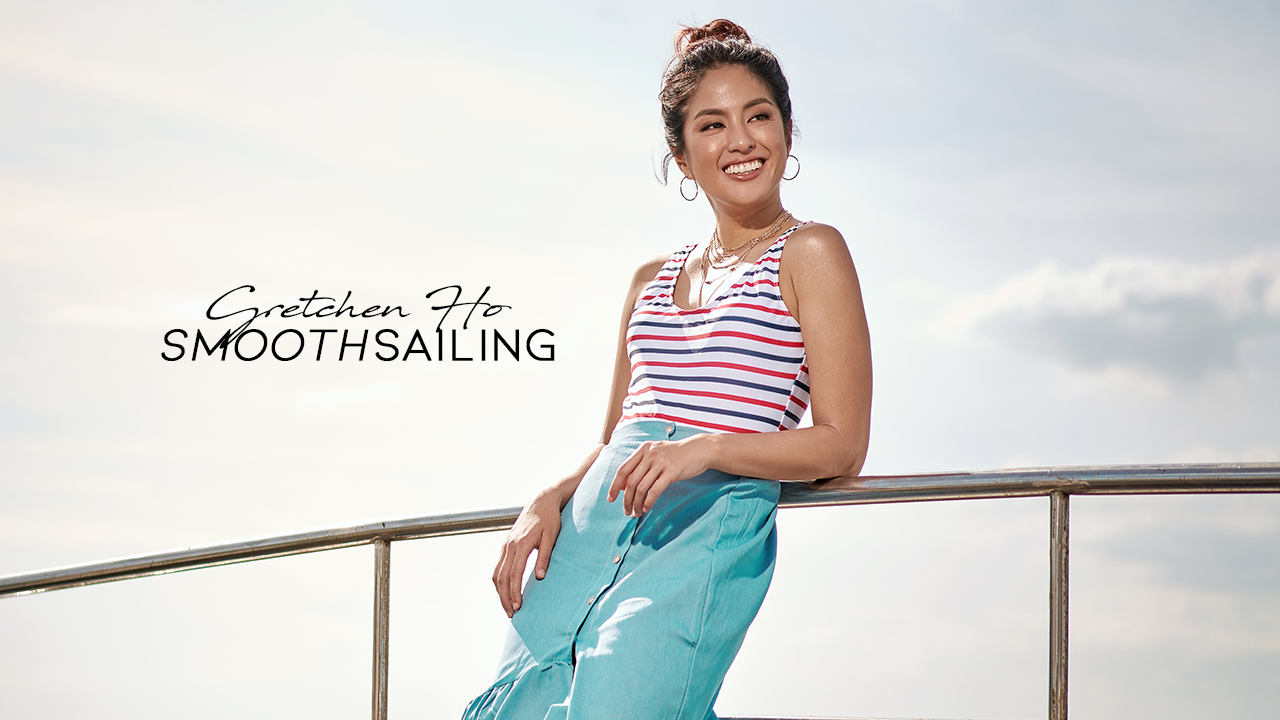
When asked what made Gretchen Ho decide to shift from a career in sports to a career in the media industry, she was quick to point out that it’s not that usual for an athlete to enter showbiz, but that the reason she did was because she wanted to transform and become a better, more confident version of herself. “I think it’s the lure of a new, big, vast world waiting to be discovered,” she shared during our interview while she was getting ready for her third look. “I always love a challenge. So I wanted to prove to myself that I can be better. I can be able to transform myself into who I envision myself to be—a more confident Gretchen. Somebody who knows how to take good care of herself.“
From a very well-followed career in volleyball (Gretchen played for the Ateneo Lady Eagles from 2008 to 2013, and was a member of the Fab 5, who brought the team to its first back-to-back UAAP appearances after 34 years), to graduating with a double degree in BS Management Engineering and AB Communications, and minoring in Development Management, Gretchen entered the television scene, where she first hosted a sports magazine show.
Despite the change, her career seems to be smooth sailing. Apart from hosting and reporting for Umagang Kay Ganda and TV Patrol, and being launched as the brand ambassador for a couple of wellness and lifestyle brands, she recently got tapped by the Australian government to get to know more about their study abroad programs and to invite fellow Filipinos to consider applying.
Read up on our June 2018 #CalyxtaGirl’s second cover story, where she talks more about her experience in Australia, and the things she witnessed that she wishes could one day be applied here.
“I always love a challenge. So I wanted to prove to myself that I can be better. I can be able to transform myself into who I envision myself to be—a more confident Gretchen. Somebody who knows how to take good care of herself.”
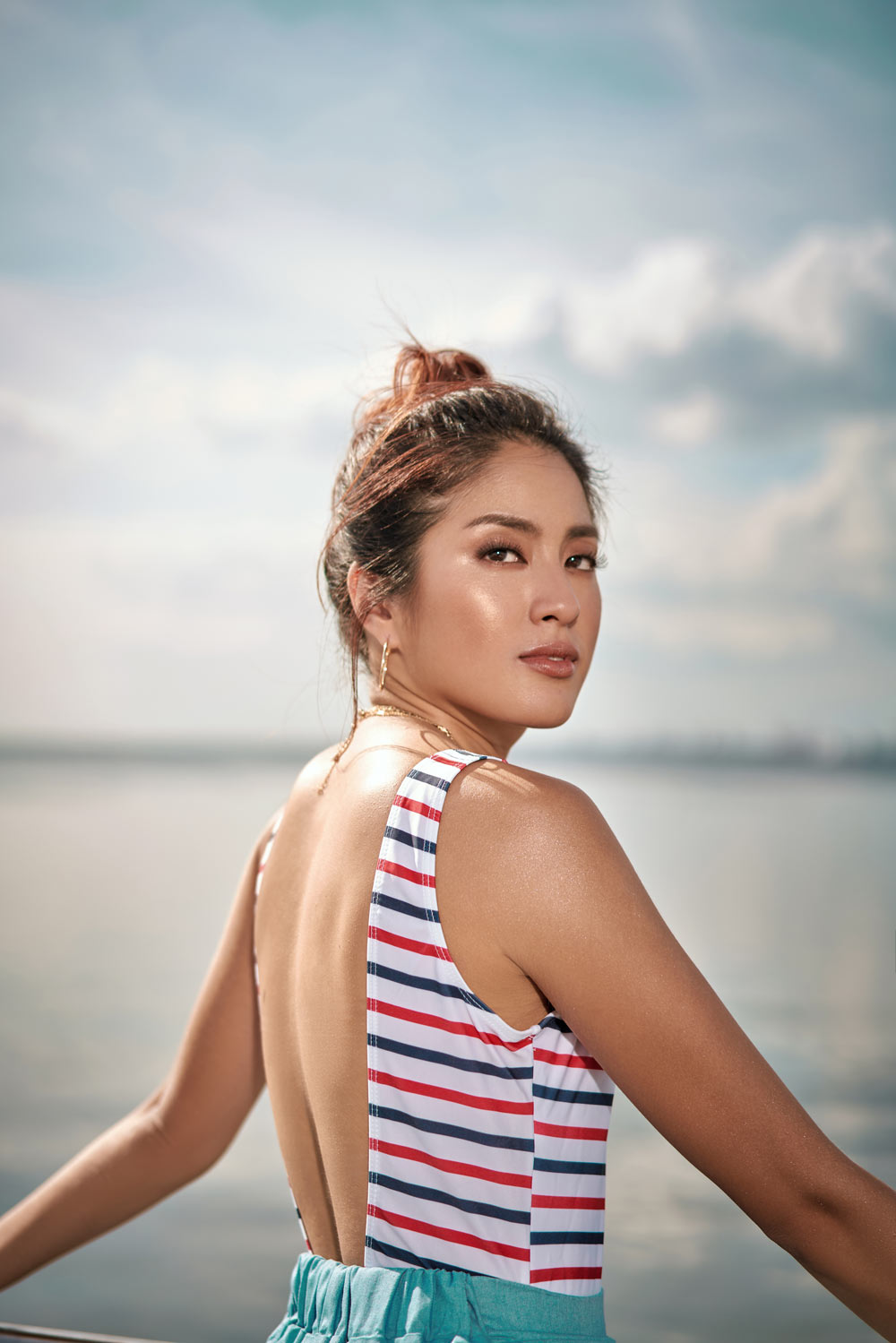
You’re always so full of energy despite having a morning show that starts at five. How do you psych yourself up every morning?
I always think that it’s a new day. There’s another chance to make things better, to be in a better perspective. And I feel like I have that responsibility to start the day with a smile because I want to share that joy with my viewers in the morning. For me, that’s my duty. That’s my responsibility. And it also makes it easier to do my job because I know that it’s not just for me. If you’re able to start other people’s day right—that simple gesture; that simple thing can change a lot of things, I think. I always tell myself and remind myself that every morning whenever I appear on TV, I need to be able to infect people with joy. And for me to be able to get into that state, I have to be emotionally and mentally healthy, so I take care of my inner well-being.
Were you always outgoing growing up or was this something that developed over time?
It developed over time. I was really shy before. I used to be scared, and I didn’t like speaking in front of the public. I didn’t have confidence before. Whenever I would watch hosts, I’d say, “Wow, they’re so good! I don’t think I can ever do that.” I mean, I’ve always been fascinated with them when I was in grade school and high school. But I never thought it would end up to be my work in the future. So I think I developed it over time through constant experience and exposure to the craft, and wanting to be better. I treated it like a sport where it was like a clean slate and I was going to start a new career. I got excited with the challenge of a new craft. I want to get better. I want to be better. I want to see myself transform.
What made you decide to shift from a career as an athlete to a career in TV?
I think it’s the lure of a new, big, vast world waiting to be discovered. Because volleyball, alam na alam ko na eh, lahat ng sulok ng court. (I know it very well already—every corner of the court.) In the twelve years that I’ve been playing, I memorize it already. I memorize all the routines, and all the things that need to be done. In a way, it becomes redundant. So when I got into TV work, I said to myself, “Wow, there’s so much I don’t know yet about the world!” Because as an athlete, of course I have a perception about the media industry, showbiz personalities, and everything. But when I was there, it wasn’t the case. I’m always proven wrong by a lot of things like, “Interesting, di pala siya ganyan,” or “Uy! Ganito pala yung mundo ng ganyan.” (Oh, it wasn’t what I thought it was or this is how this world looks like.) And I guess I enjoy it. I always love a challenge. So I wanted to prove to myself that I can be better. I can be able to transform myself into who I envision myself to be—a more confident Gretchen. Somebody who knows how to take good care of herself. And the pressure of showbiz, and the pressure of the media, I think helped me achieve that. Because it’s not really usual for an athlete to enter showbiz or the media industry, right? It’s a little bit opposite on the scale. But I enjoyed it! I told myself, “I want to see myself in that way.” And as long as I’m not stepping on anyone, as long as I’m being better every day—there’s nothing wrong with doing something new. Before, it wasn’t usual for athletes to enter media and when I was starting, some people would ask me, “Why’d you enter TV? Why not corporate? You won’t be able to use your degree in that industry.” They’d say that. So I would reply, “No, I’m not. I’m also using what I know here.” So I wanted to prove people wrong. I’d say, “This hosting job, I’m not just going to do it because I want to be on TV. I’m going to do it because I want to do it. I want to learn it, I want to do it right, I want to do it well, I want to be good at it.” So there! That’s why I just keep accepting more of this work. I give talks, I host, I even audition. It’s a way of expanding my personality, especially because I come from a Chinese background where things are more rigid and strict, and we’re not as expressive. I wanted to break out of that box, and for me to be able to do that, I constantly expose myself to different things.
What was your dream job when you were a little girl?
I wanted to be a basketball player. (laughs) Really! As in I wanted to be an NBA player. As weird as it sounds. Basketball was my first sport. That’s why the NBA trip was a dream for me. Because it was my dream to become an NBA player. Not WNBA—I wanted NBA. And my dad would just laugh at me. He even sent me to the PBA games. We didn’t have a basketball varsity team, just volleyball. So I said, “I really want to be an athlete.” So I shifted sports and then I fell in love with volleyball.
When did your love for travel all start?
It started, I think way before—because I mentioned earlier that I’m travel deprived. So everytime I get the chance to go out, like with my teammates may it be in Tagaytay or Batangas, actually anywhere really, I savor the moment. As in whether it’s a road trip or riding an airplane. Every time I see a new scenery, even if it’s just the Taal volcano, I’m so happy already! Because I had this craving—I wanted to discover more about the world, but I couldn’t do it before because I wasn’t allowed.
You recently went to Australia to know more about their Study in Australia Program. Can you tell us more about it?
The Australian embassy got me to promote the universities, to go around Australia to promote their universities in the Philippines, and they got me because they thought I was the perfect embodiment of the Australian lifestyle. Because I love the outdoors-I’m very athletic, and I love travelling. At the same time, the study part. So as a journalist, I’ll be able to talk about that more. When I went there, I was really fascinated and impressed by their culture. Like you could feel that the government is present. You could feel it working for the people. Their people are supported well. For example, if you have a project, they really provide you funds or give you a network to be able to start it. Those with no jobs are supported and helped by the government. And everyone has access to healthcare. So it’s nice! You can really see how efficient their government is.
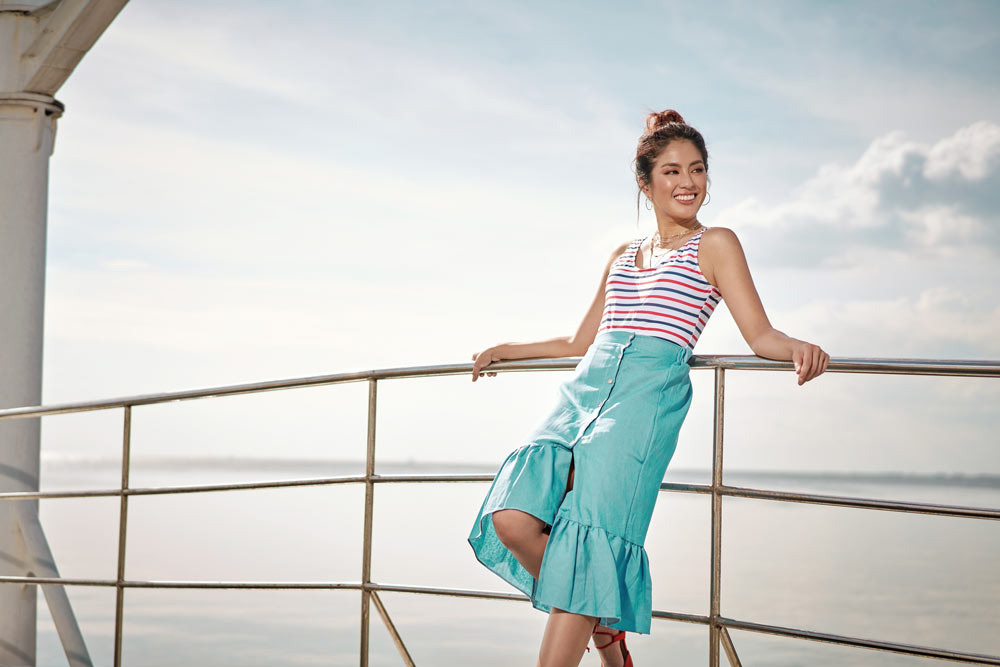
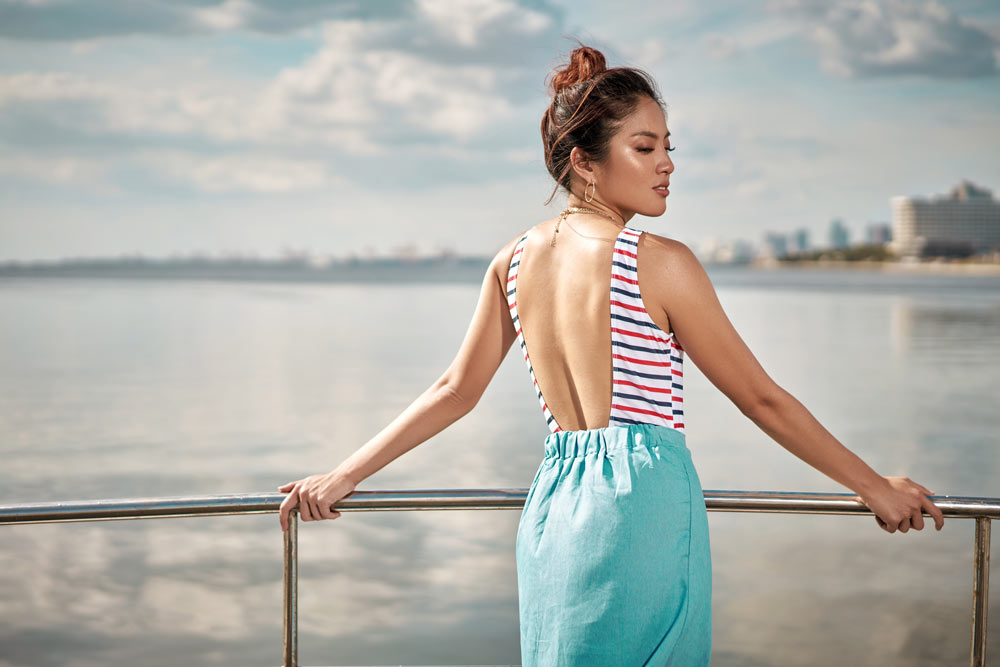
They’re also very particular with their food. Their food is so good. And the coffee? My gosh! And the wine, and the cheese, the yogurts, and the fruits! Everything was so good. It was a constant food trip. It fascinates me how particular they are, but at the same time, they’re also laidback. They’re friendly, very simple people. They’re not very fashown. They just wear t-shirts, shorts, or workout clothes. And that’s okay. Plus everybody is fit—it’s amazing.
And then the universities, that was the only time I realized how advanced they are. They toured me around. They have something similar to our TESDA—it’s called TAFE (Technical and Further Education). In Australia, that’s the same level as universities. So if for example, you studied how to cook, do barista work, or bake. They really give you the proper skills to achieve that, no matter what age you are. There’s no age discrimination. They’re not allowed to ask how old you are when you apply for work. As long as you’re hardworking and you want to be better, you can do it! Because of the schools.
And I’m amazed with how work is there. Because with us, when you say corporate, there’s a ladder that you have to climb. There are set jobs. But there, for example if you want to cook, you can be a pastry chef. They have particular roles. When it comes to their architecture, they have a building designer, and someone who does the structure of it. So I think you’d be able to find your way there because they provide you with everything. Oh, and I also went to one of their schools that specialize in communication. RMIT is one. And they teach virtual reality broadcasting to the students. There was a Pinoy there who just uses VR—practical use of VR. So it’s amazing how high the level of education is there. I think here in the Philippines, it’s not very well-known yet. That’s why they got me. It was an eye-opener for me, my trip there.
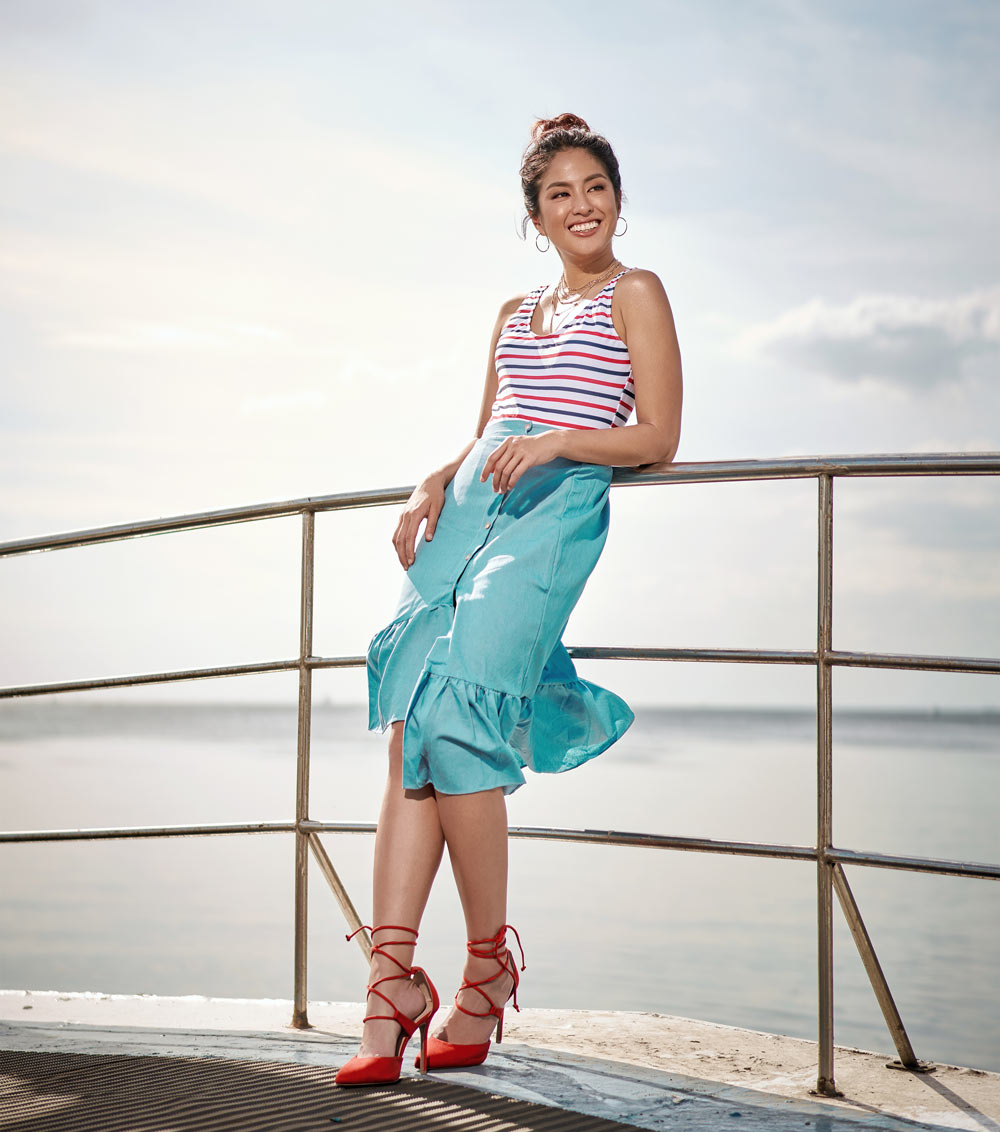
Cover Story By: GRETCHEN GATAN
Art Direction: MARGAUX CORTEZ
Editorial Assistant: MAAN FERNANDEZ
Videographer: ANDREW APUYA
Photographer: DOOKIE DUCAY
Makeup: OWEN SARMIENTO
Hair: RJ DELA CRUZ
Stylist: ICA VILLANUEVA
Special thanks to: PRESTIGE CRUISES
If given the chance, would you go for a “Study Abroad” program?
Yes! I’ve been looking at that actually. I’ve been trying to choose between New York or Australia. Initially, I really wanted New York so I could study digital journalism. That was my plan for this year. But I held it off because of work here. I told myself, “Not now.” But when I saw the programs in Australia, I was like, “Wow, it’s so nice here!” So now I’m conflicted. And like I said, it gives you a global perspective. When I’m out there, I feel like I’m dealing with a much bigger world and it’s very inspiring talking to a lot of people. And your way of thinking widens. Because here, there’s a certain way that we live. In other places, they’re just starting to study social media. But here, we’re deeply involved in other people’s lives. Unlike abroad, where’s it’s more, “Mind your own business.” So it’s nice to be able to see that kind of world.
You mentioned that the work-life balance was a major factor for Australians because of the way they value time and family. What were the things that you witnessed or experienced from there that you wish that could eventually be applied here?
I want people to have that sense of comfort in the government. And in terms of lifestyle, I met a lot of Filipinos there and nobody wants to come back to the Philippines anymore. Because they have a good life. Even if they’re working in a factory, for example. Their salary is enough to give them good food on the table, for them to buy the clothes that they want. There’s comfort. Because here, when you look at the people, don’t you get frustrated with all the inefficiencies like the traffic? Everyday, there are so many stressors and I think that’s one of the reasons why they’re so chill in Australia. Because they don’t have stressors there. Us, we get exasperated right away. Because of the environment that we’re in. Traffic, pollution, the heat, corruption, etc. But when you’re there, people are more relaxed. You can live the good life. So if I was given the chance to bring something from there here, that’s what I’d like to bring. But I think that’s hard. That’s hard.




